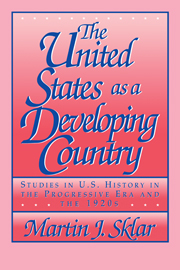 The United States as a Developing Country
The United States as a Developing Country Book contents
- Frontmatter
- Contents
- Preface
- I Periodization and historiography: The United States considered as a developing country
- II Studying American political development in the Progressive Era, 1890S–1916
- III Dollar Diplomacy according to Dollar Diplomats: American development and world development
- IV Woodrow Wilson and the developmental imperatives of modern U.S. liberalism
- V Some political and cultural consequences of the disaccumulation of capital: Origins of postindustrial development in the 1920s
- VI Disaffected with development: Henry Adams and the 1960s “New Left”
- VII The corporate reconstruction of American capitalism: A note on the capitalism–socialism mix in U.S. and world development
- Index
III - Dollar Diplomacy according to Dollar Diplomats: American development and world development
Published online by Cambridge University Press: 03 February 2010
- Frontmatter
- Contents
- Preface
- I Periodization and historiography: The United States considered as a developing country
- II Studying American political development in the Progressive Era, 1890S–1916
- III Dollar Diplomacy according to Dollar Diplomats: American development and world development
- IV Woodrow Wilson and the developmental imperatives of modern U.S. liberalism
- V Some political and cultural consequences of the disaccumulation of capital: Origins of postindustrial development in the 1920s
- VI Disaffected with development: Henry Adams and the 1960s “New Left”
- VII The corporate reconstruction of American capitalism: A note on the capitalism–socialism mix in U.S. and world development
- Index
Summary
For an accurate understanding of events, the historian can not exclusively rely upon the conception that the participants had about themselves and about the nature of their actions. It appears, however, that in neglecting an examination of the ideology of the Dollar Diplomats, historians have often enough attempted to see Woodrow Wilson's intentions in foreign affairs through his own eyes, but have rarely extended the same courtesy to the Dollar Diplomats. The assumption, apparently, is that as a “business diplomacy,” Dollar Diplomacy functioned in the manner of a reflex, as it were, to practical “interests,” and therefore involved no underlying considerations beyond the immediate profit calculus; but that President Wilson's diplomacy, as one based upon moralism and vision, however sound or misguided, sprang from a complex body of thought transcending the marketplace mentality, and consequently requires analysis in light of the underlying ideology, philosophy, or outlook.
The respective foreign policies of Dollar Diplomacy and President Wilson have therefore been differentiated less in their results, which historians agree were in many respects essentially similar, than in their motives, the one springing from “interests,” the other from “ethics.” With so wide an agreement on results, it might seem best to leave the question of motives to novelists, poets, and politicians – Clio, after all, like the law, becomes cross-eyed when stripped of her blindfold. But the currently prevalent differentiation according to motives conceals a neglect of an inquiry into the substantive content and objectives of the diplomacy and foreign policies in question.
- Type
- Chapter
- Information
- The United States as a Developing CountryStudies in U.S. History in the Progressive Era and the 1920s, pp. 78 - 101Publisher: Cambridge University PressPrint publication year: 1992


